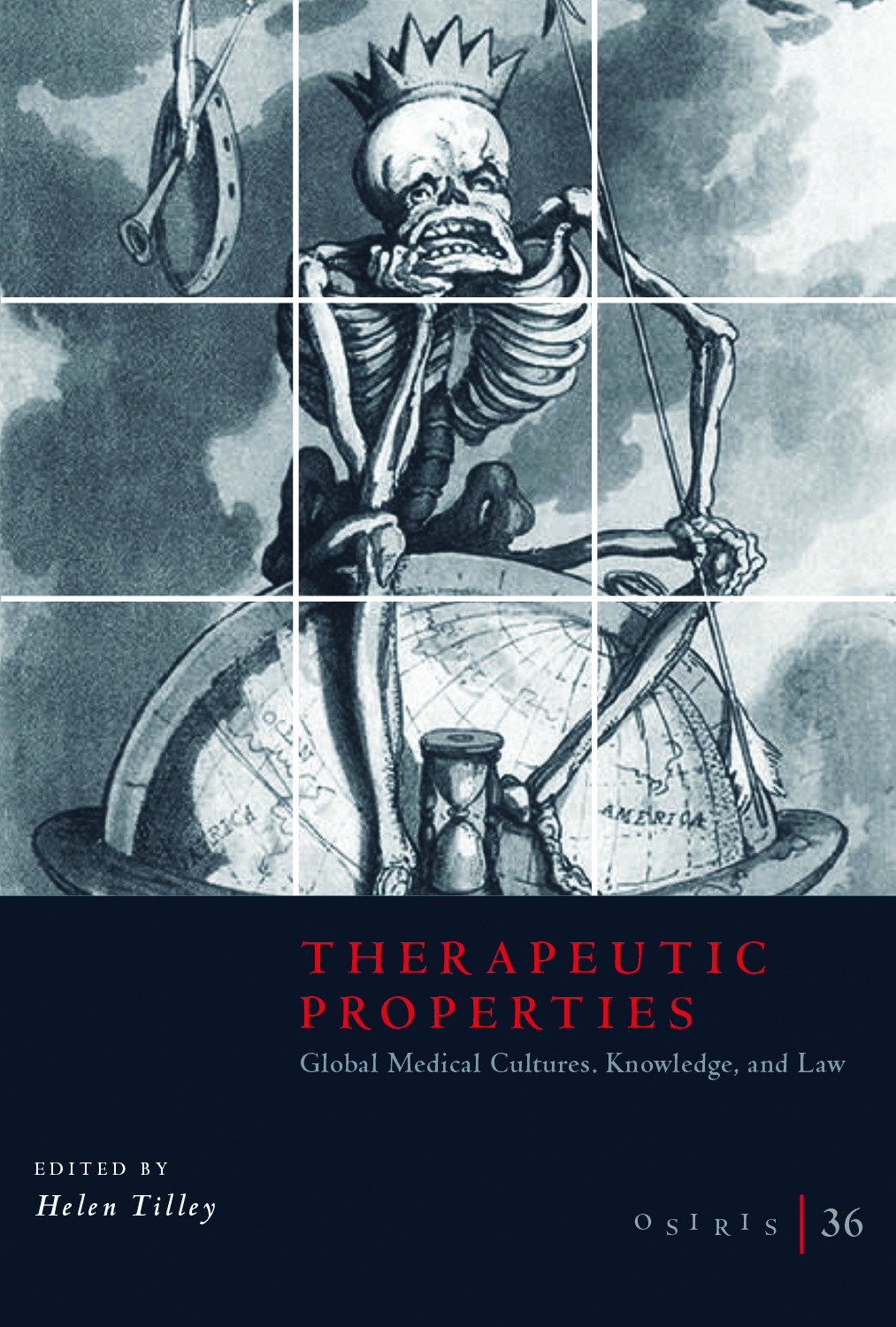 [We share the following announcement of a new publication.]
[We share the following announcement of a new publication.]
Osiris, Volume 36:
Therapeutic Properties: Global Medical Cultures, Knowledge, and Law
Edited by Helen Tilley
Published by the University of Chicago Press on behalf of the History of Science Society
This volume of Osiris takes as its point of departure a simple premise: we have yet to fully flesh out the complex historical interplay between medicine and law across the globe. Therapeutic Properties takes an inventive look at the issue, presenting welcome insights on the worldwide ascendancy of biomedicine, the persistence of nonofficial and unorthodox approaches to healing, and the legal contexts that have served to shape these dynamics.
The contributions draw upon source material from the Americas, Africa, Western Europe, the Caribbean, and Asia to trace the influence of penal and civil codes, courts and constitutions, and patents and intellectual properties on not only health practices, but also the very foundations of state-sanctioned medicine. The authors explore, too, how institutions of global governance, including those underpinning empires and trade, have historically created feedback loops that enabled laws and regulatory regimes to spread, amplifying their effects and standardizing approaches to diseases, drugs, professions, personhood, and well-being along the way. Highlighting the payoff of interdisciplinary and transnational analyses, Therapeutic Properties adroitly teases apart how different actors fought to write the rules of global health, rendering certain approaches to life and death irrelevant and invisible, others pathological and punishable by law, and others still, normal and natural.
Table of Contents after the jump:
INTRODUCTION
Medical Cultures, Therapeutic Properties, and Laws in Global History
Helen Tilley
PART 1 - REBELLIOUS SPIRITS AND MEDICAL IMAGINATIONS
Translating Spirits: Medical-Ritual Healing and Law in Brazil and the Broader Afro-Atlantic World
Paul Christopher Johnson
Powers of Imagination and Legal Regimes against “Obeah” in the Late Eighteenth- and Early Nineteenth-Century British Caribbean
Kate Ramsey
Of Jinn Theories and Germ Theories: Translating Microbes, Bacteriological Medicine, and Islamic Law in Algeria
Hannah-Louise Clark
PART 2 - CONSTITUTIVE LAWS AND UNPRECEDENTED TRADITIONS
Subaltern Surgeries: Colonial Law and the Regulation of Traditional Medicines in the British Raj and Beyond
Projit Bihari Mukharji
The Reinvention of an Appropriate Tradition or the Colonial Birth of Vietnamese Medicine
Laurence Monnais
Traditional Medicine Goes Global: Pan-African Precedents, Cultural Decolonization, and Cold War Rights/Properties
Helen Tilley
PART 3 - BODIES OF LAW AND LAWS OF BODIES
Sexual Assault and the Evidential Body: Forensic Medicine and Law in Modern Japan
Susan L. Burns
Enabling Restrictions: Female Sterilization, Physicians, and the Law in Costa Rica, 1960–1999
María Carranza Maxera
The Geopolitics of “Rape Kit” Protocols: Historical Problems in Translation as Humanitarian Medicine Meets International Law
Jaimie Morse
PART 4 - REDEFINING PROPERTIES AND PATENTING POWERS
Patenting Personalized Medicine: Molecules, Information, and the Body
Mario Biagioli and Alain Pottage
The Intellectual Property Turn in Global Health: From a Property to a Human Rights View of Health
Laura G. Pedraza-Fariña
Becoming “Traditional”: A Transnational History of Neem and Biopiracy Discourse
Anna Winterbottom
Properties of (Dis)Possession: Therapeutic Plants, Intellectual Property, and Questions of Justice in Tanzania
Stacey Langwick
PART 5 - JUDICIARY MAGIC AND LEGAL THERAPIES
The Pharmaceuticalization and Judicialization of Health: On the Interface of Medical Capitalism and Magical Legalism in Brazil
João Biehl
Legalities of Healing: Handling Alterities at the Edge of Medicine in France, 1980s to 2010s
Emilie Cloatre, Nayeli Urquiza-Haas, and Michael Ashworth
Further information is available here.